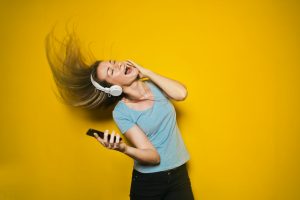environmental, Mental Wellbeing, Physical Wellbeing, social
Was dance our first language?
As Dancers we inherently know that the music is at least 50% of the reason why we dance. We learn to express our interpretations of the music through our bodies. But who was the first human to strike a note and make a tune? And who first taught us to dance?
From the dawn of time (well technically quite a bit before we logged time as a concept, or had any way of tracking it) humans have created music and moved to it. Even before we could speak a recognisable language or write.
The oldest known musical instrument in the world, a 60,000-year-old Neanderthal flute that was discovered in Divje babe cave near Cerkno and has been declared by experts to have been made by Neanderthals. Perhaps even more shockingly, this discovery was made at a time when we believed Neaderthals had no recognisable complex language abilities. This find proves that our ancestors, far from the primitive simple minded creatures we once assumed them be, were, in fact, innovative and sensitive people capable of artistic expression.
Music and the practice of moving to music has traveled with us throughout time. So we’d not be doing our jobs properly if we didn’t take a moment to look at why dance and music are inexorably linked and so incredibly good for us! After all if they have withstood the test of time and we still aren’t bored of them, they must be pretty essential to how we not only survive, but thrive.
The two are so entwined into human history and evolution that it should not be surprising the emotional and physical effect they can have on us.
In fact they are so powerful that dance and music therapy can now be prescribed on the NHS for depression, anxiety, Parkinson’s and Alzheimers to mention just a few.
There is so much research out there on dance and music that we could talk about it for hours.
Quite literally
But we will try not to bore you for now!
For more modern day research on the effects of music and dance on our brains and development, one of our favourite researchers though is Dr Peter Lovatt, who amongst many other things has some wonderful TED talks on the psychology of dance, it’s role in our social connections and status and how Dance and music shaped our evolution.
Just one gleaming gem from Dr Lovatt, is the observations that we never teach babies to respond to music. Instead we play music and they instinctively bounce to the beat, go quiet for calmer songs and become excited for something faster tempo.
Click below to learn more or visit: https://www.peterlovatt.com
And incase you are in any doubt, here is just a shortlist of the benefits of dance and music for us!
Benefits of music:

- Boosts memory
- Particularly sensory and long term memory
- Music flares key memory centres in the brain connected to emotional experiences
- Provides Serotonin, dopamine and oxcytocin (happy hormones)
- Effects heart rate and brain waves (up or down dependant on the music)
- Check out Binurial beats or sonographic wave music for healing, focus, calm, sleep and many more
- Boost physical performance
- Many surgeons and athletes use music consciously to boost their mood, energy and focus
- Stimulate the parasympathetic nervous system – a network of nerves that relaxes your body after periods of stress or danger.
Benefits of Dance:
- Boosts memory
- Choreo helps with mapping and sequenced learning
- Freestyle boost the number of nerve connections, particularly in your creative brain and cognitive reserves which help you make complex decisions faster
- Improves problem solving abilities and the speed fo doing so
- Lowers blood pressure
- Decreases depression and anxiety
- Provides Serotonin, dopamine and oxcytocin (happy hormones)
- Improves balance and small motor functions
- Improves spacial awareness (avoid bumping into things etc)
- Good for your heart health
We are the only known species on this plant to create music and move to it, simply for the joy of it as well. And our brains and our bodies respond to both with enthusiasm.
We have included music and movement into our religious, spiritual and cultural practices for millennia.
We’ve used song to communicate, remember and heal.
We’ve used dance, to express, resonate and story tell.
In short, music and dance help us express, connect, let go, grow and re-seton all know planes of existence. Dance and music are existential expressions of human creativity and vitality that run far deeper than words ever can.
Even if we eventually prove that we had structured language before any proven existence of music or dancing, we don’t believe this in any way reduces the significant that movement to music has to us as a both individuals or communities.
Which leads us to the question; If movement to music is so very deeply a part of us and has the ability to literally require our brains and change our bodies; What would happen if we didn’t fear others watching us?
If we really let go and learnt into the magic we have created for ourselves?
If we gave up fears of being ‘good enough’ or unhealthy mindsets of comparison and self judgment, what might we achieve both on and off the dance floor?
What would we discover about ourselves and others?
We’d like to think that dancing gives us an edge and intuition into our true potential and a uniquely beautiful was to connect and communicate on a deeper level than words alone.
But then we are pretty biased.
What do you think?
